Here is the working code that I use. It might be a little more than what you are after, but hopefully you can adjust to suit.
It handles both zip and non-zipped files, and discards and extensions that you want to ignore. It also can automatically download any cloud based attachments that are too big to send over email. It saves the zipped attachment to a temp folder before extracting the data. Saved and unzipped attachments are also routed to their appropriate folders.
SaveAttachments Method: This is the main method is run based upon an Outlook rule. The destination folder for the attachment is set according to the email's subject (the case statement). In the example code, if the subject is 'Test', then instead of downloading the attachment, it searches for an in-text hyperlink and downloads the cloud based attachment. If the attachement is a .zip file, then it downloads it to a temp folder and calls the 'Unzip Method'.
Unzip Method: This takes in the unzipped file and unzips it to the destination folder
IsInArray Function: Looks to see if the extension of the attachment is in the array of skipped attachment (eg jpg). Returns True or False.
LaunchURL Method: Searches through every word in the email and looks for the a URL that matches the defined URL for the cloud based attachment (fuzzy match on domain name). Names the file with the current sender, date and time.
DownloadFileFromWeb Function: Launches the URL for the cloud based attachment (as defined by the LaunchURL method) and saves it to the appropriate folder
Public Sub SaveAttachments(Item As Outlook.MailItem)
Dim objAttachments As Outlook.Attachments
Dim lngCount, i As Long
Dim strFile, sFileType, destinationFolder, destinationFolderPath, username, subject, rootFolderPath, tempFolderPath, tempFolder, ext, sender As String
Dim isZipped As Boolean
Dim skippedExts() As String
'Gets username
username = VBA.Interaction.Environ$("UserName")
'Sets the root folder ************************* EDIT THIS *******************************
rootFolderPath = "C:\Users\" & username & "\Box Sync\Save and Unzip Test\"
'Sets the temp folder Name used to hold the zipped downloads ************************* EDIT THIS *******************************
tempFolder = "Zip Files"
'List the extentions that you want to skip delimited by a bar '|' ************************* EDIT THIS *******************************
skippedExts = Split("jpg|jpeg|png|gif", "|")
'Sets the destination folder is set to match it's appropiate data sources ************************* EDIT THIS *******************************
Select Case Item.subject
Case "Test"
destinationFolder = "TestFolder"
Case Else
destinationFolder = "DefaultFolder"
End Select
'********************************************************************************************************************************************
'Sets the root path for non-zipped files
destinationFolderPath = rootFolderPath & destinationFolder & "\"
'Sets the temp folder path for the zip files
tempFolderPath = rootFolderPath & tempFolderName & "\"
'Launchs another method if the sender is Convetro to download the file from the URL
If destinationFolder = "Test" Then
Call LaunchURL(Item, destinationFolderPath)
Exit Sub
End If
If Item.Attachments.Count > 0 Then
Set objAttachments = Item.Attachments
'Counts the number of attachments
lngCount = objAttachments.Count
For i = lngCount To 1 Step -1
'Resets the Boolean
isZipped = False
'Get the file name of the attachment
strFile = objAttachments.Item(i).fileName
'Gets the file extention
ext = Split(strFile, ".")(UBound(Split(strFile, ".")))
'If the attachment is an image, then skip it (calls the function to check whether the ext is in the array 'skippedExts')
If IsInArray(ext, skippedExts) = True Then
GoTo NextAttachment
End If
'If the attachment is a zip, then the path is set to a temp folder.
If ext = "zip" Then
strFolderpath = tempFolderPath
isZipped = True
Else
strFolderpath = destinationFolderPath
End If
'Combine with the path to the folder
strFile = strFolderpath & strFile
'Save the attachment as a file
objAttachments.Item(i).SaveAsFile strFile
'Calls the Unzip method to unzip the saved attachment
If isZipped = True Then
Call Unzip(strFile, destinationFolderPath)
End If
NextAttachment:
Next i
End If
End Sub
Sub Unzip(ByVal strFile As Variant, ByVal destinationFolderPath As String)
Dim FSO, oApp As Object
Dim destinationPath As Variant
'Sets the folderpath string as a variant
destinationPath = destinationFolderPath
'Extract the files into the newly created folder
Set oApp = CreateObject("Shell.Application")
oApp.NameSpace(destinationPath).CopyHere oApp.NameSpace(strFile).Items
On Error Resume Next
Set FSO = CreateObject("scripting.filesystemobject")
FSO.deletefolder Environ("Temp") & "\Temporary Directory*", True
End Sub
Private Function IsInArray(ByVal stringToBeFound As String, ByVal arr As Variant) As Boolean
IsInArray = (UBound(Filter(arr, stringToBeFound)) > -1)
End Function
Private Declare PtrSafe Function URLDownloadToFile Lib "urlmon" Alias "URLDownloadToFileA" (ByVal pCaller As Long, ByVal szURL As String, ByVal szFileName As String, ByVal dwReserved As Long, ByVal lpfnCB As Long) As Long
Private Declare PtrSafe Function DeleteUrlCacheEntry Lib "wininet.dll" Alias "DeleteUrlCacheEntryA" (ByVal lpszUrlName As String) As Long
Sub LaunchURL(itm As MailItem, ByVal destinationPath As String)
Dim bodyString As String
Dim bodyStringSplitLine
Dim bodyStringSplitWord
Dim splitLine
Dim splitWord
Dim fileName, URL As String
'Defines 'bodyString' as the body of text in the email
bodyString = itm.Body
'Breaks the body copy into multiple lines
bodyStringSplitLine = Split(bodyString, vbCrLf)
'Sets the desired name of the file ************ Edit here *******************
fileName = "MySender--" & Format(Now(), "yyyy-mm-dd--hh-mm-ss") & ".csv"
'Loop to run through ever line in the email and split it into a bunch of words
For Each splitLine In bodyStringSplitLine
bodyStringSplitWord = Split(splitLine, " ")
'Loop to run through ever word in the line, and test whether it's the link we are looking for
For Each splitWord In bodyStringSplitWord
'A test to see whther the word is the URL link that we are looking for *************************** Edit here **********************************
If Left(splitWord, 34) = "<https://myURLtobedownloaded.com/" Then
'Deletes the "<>" from the URL
URL = splitWord
URL = Replace(Replace(URL, "<", ""), ">", "")
'If the word is the URL link, then it calls the function DownloadFileFromWeb and saves it to the destination folder
Call DownloadFileFromWeb(URL, destinationPath & fileName)
End If
Next
Next
Set itm = Nothing
End Function
Private Function DownloadFileFromWeb(URL As String, SavePath As String) As Boolean
Dim MyLink As String
Dim Ret As Long
'First delete the file from cache:
DeleteUrlCacheEntry URL
'Download the file and return result:
DownloadFileFromWeb = False
Ret = URLDownloadToFile(0, URL, SavePath, 0, 0)
DoEvents
If Ret = 0 Then DownloadFileFromWeb = True
End Function
